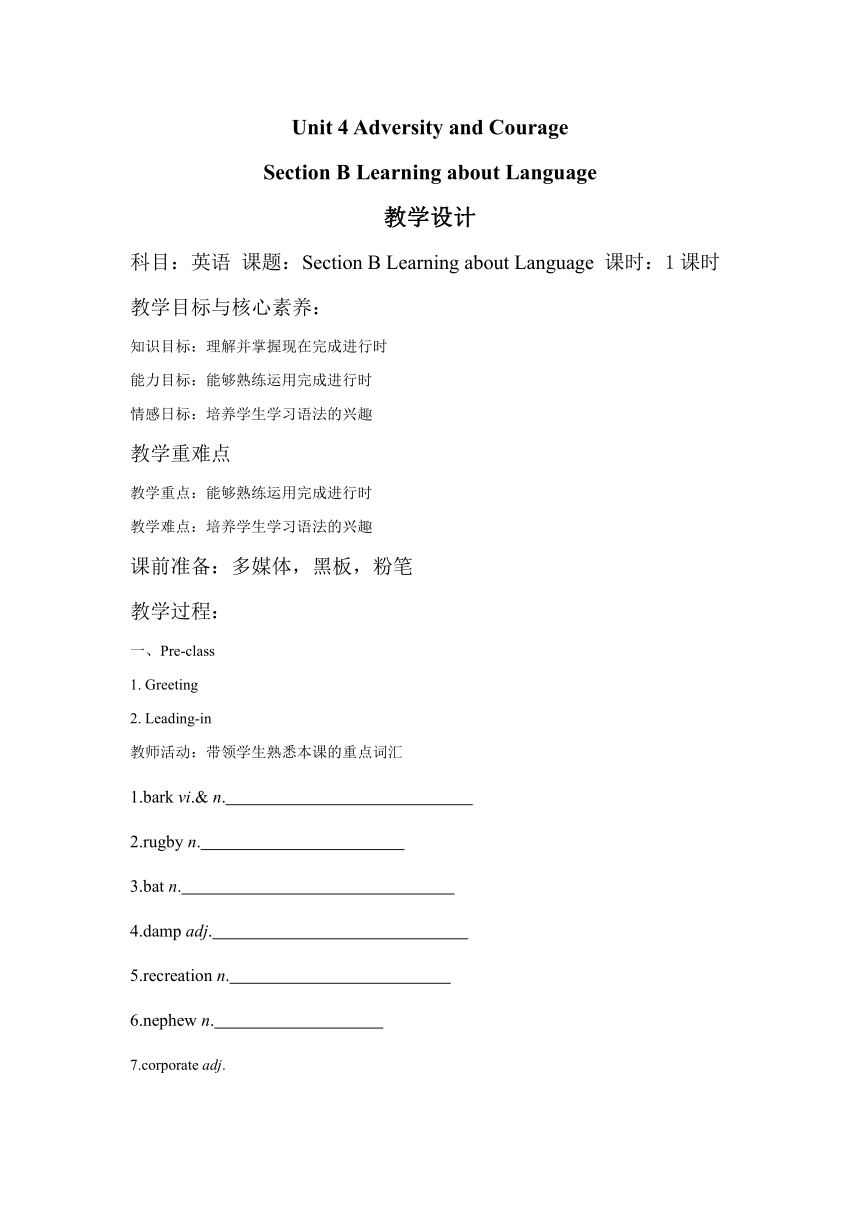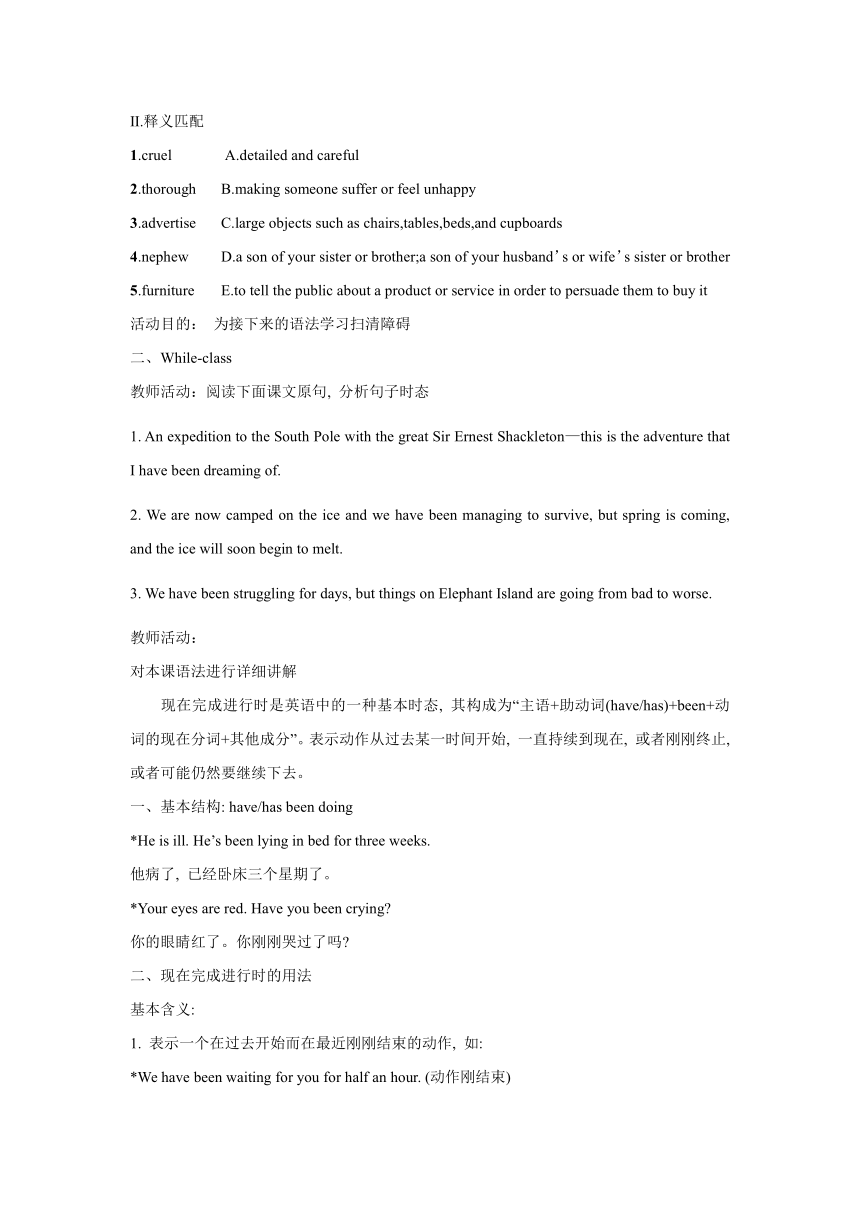人教版(2019)选择性必修第三册Unit4 Adversity and Courage-SectionB Learning about Language教案
文档属性
| 名称 | 人教版(2019)选择性必修第三册Unit4 Adversity and Courage-SectionB Learning about Language教案 |  | |
| 格式 | zip | ||
| 文件大小 | 192.6KB | ||
| 资源类型 | 教案 | ||
| 版本资源 | 人教版(2019) | ||
| 科目 | 英语 | ||
| 更新时间 | 2022-04-16 12:41:51 | ||
图片预览


文档简介
Unit 4 Adversity and Courage
Section B Learning about Language
教学设计
科目:英语 课题:Section B Learning about Language 课时:1课时
教学目标与核心素养:
知识目标:理解并掌握现在完成进行时
能力目标:能够熟练运用完成进行时
情感日标:培养学生学习语法的兴趣
教学重难点
教学重点:能够熟练运用完成进行时
教学难点:培养学生学习语法的兴趣
课前准备:多媒体,黑板,粉笔
教学过程:
一、Pre-class
1. Greeting
2. Leading-in
教师活动:带领学生熟悉本课的重点词汇
1.bark vi.& n.
2.rugby n.
3.bat n.
4.damp adj.
5.recreation n.
6.nephew n.
7.corporate adj.
Ⅱ.释义匹配
1.cruel A.detailed and careful
2.thorough B.making someone suffer or feel unhappy
3.advertise C.large objects such as chairs,tables,beds,and cupboards
4.nephew D.a son of your sister or brother;a son of your husband’s or wife’s sister or brother
5.furniture E.to tell the public about a product or service in order to persuade them to buy it
活动目的: 为接下来的语法学习扫清障碍
二、While-class
教师活动:阅读下面课文原句, 分析句子时态
1. An expedition to the South Pole with the great Sir Ernest Shackleton—this is the adventure that I have been dreaming of.
2. We are now camped on the ice and we have been managing to survive, but spring is coming, and the ice will soon begin to melt.
3. We have been struggling for days, but things on Elephant Island are going from bad to worse.
教师活动:
对本课语法进行详细讲解
现在完成进行时是英语中的一种基本时态, 其构成为“主语+助动词(have/has)+been+动词的现在分词+其他成分”。表示动作从过去某一时间开始, 一直持续到现在, 或者刚刚终止, 或者可能仍然要继续下去。
一、基本结构: have/has been doing
*He is ill. He’s been lying in bed for three weeks.
他病了, 已经卧床三个星期了。
*Your eyes are red. Have you been crying
你的眼睛红了。你刚刚哭过了吗
二、现在完成进行时的用法
基本含义:
1. 表示一个在过去开始而在最近刚刚结束的动作, 如:
*We have been waiting for you for half an hour. (动作刚结束)
我们一直等了你半个小时。
2. 表示一个从过去开始但仍在进行的动作, 如:
*The Chinese have been making paper for two thousand years. (动作还将继续下去)中国有两千年的造纸历史。
3. 表示一个从过去开始延续到现在, 可以包括现在在内的一个阶段内, 重复发生的动作, 通常表示关切、惊异、愤怒、赞许等感彩。
*She has been playing tennis since she was eight. (惊异)
她从八岁开始打网球。
*You have been coughing a lot lately. (关切)
近来你一直咳嗽。
*Too much has been happening today. (感慨)
今天真是个多事的日子啊。
*He has always been studying hard. (赞许)
他学习一直很刻苦。
4. 常与现在完成进行时连用的时间状语: all day, all this morning, all these years, for+时间段。
*She is very tired, because she has been doing some cleaning all day. 她很累, 因为她整天都在打扫卫生。
*(2020·全国Ⅲ卷)It’s hard to tell exactly how many people agree with him, but research indicates that the numbers have been rising for some time. 很难确切说出有多少人同意他的观点, 但研究表明, 这一数字一段时间以来一直在上升。
三、现在完成进行时与现在完成时的区别
有些动词不能用于现在完成进行时, 但可用于现在完成时, 这些动词为:
状态动词: be, have, exist. . .
情感动词: like, love, hate. . .
感觉动词: see, hear, know, feel, sound. . .
短暂性动词: finish, marry, get up, come, go. . .
*I have known him for years. 我认识他已经好几年了。
*They have finished the work. 他们已经完成了这份工作。
三、After-class
Ⅰ. 用所给词的适当形式填空
1. Tom ________________(work) hard since the new term began.
2. She ought to stop work; she has a headache because she _______________(read)
all day long.
3. Since I won the prize, my phone has never stopped ringing. People _________
________ (phone) to ask how I will spend the money.
4. He ________________(work) in this school since he graduated from university.
5. We _________________(work) on this project for four hours. Let’s have a rest.
6. It is the third time that you _________(come) to our school.
7. So far Peter __________(not ring) back. Shall we make a phone call to him again
8. They have been discussing the problem for two hours, but they _______________
(not reach) any result yet.
四、Summary
掌握现在完成进行时应注意的三点:
1. 现在完成进行时表示动作的持续进行, 或者刚刚终止, 或者可能仍然要继续下去。
2. 现在完成进行时表示关切、惊讶、愤怒、赞许等感彩。
3. 牢记常与现在完成进行时态搭配的时间状语 all day, all this morning, all these years,
作业布置:完成同步课时作业。
Section B Learning about Language
教学设计
科目:英语 课题:Section B Learning about Language 课时:1课时
教学目标与核心素养:
知识目标:理解并掌握现在完成进行时
能力目标:能够熟练运用完成进行时
情感日标:培养学生学习语法的兴趣
教学重难点
教学重点:能够熟练运用完成进行时
教学难点:培养学生学习语法的兴趣
课前准备:多媒体,黑板,粉笔
教学过程:
一、Pre-class
1. Greeting
2. Leading-in
教师活动:带领学生熟悉本课的重点词汇
1.bark vi.& n.
2.rugby n.
3.bat n.
4.damp adj.
5.recreation n.
6.nephew n.
7.corporate adj.
Ⅱ.释义匹配
1.cruel A.detailed and careful
2.thorough B.making someone suffer or feel unhappy
3.advertise C.large objects such as chairs,tables,beds,and cupboards
4.nephew D.a son of your sister or brother;a son of your husband’s or wife’s sister or brother
5.furniture E.to tell the public about a product or service in order to persuade them to buy it
活动目的: 为接下来的语法学习扫清障碍
二、While-class
教师活动:阅读下面课文原句, 分析句子时态
1. An expedition to the South Pole with the great Sir Ernest Shackleton—this is the adventure that I have been dreaming of.
2. We are now camped on the ice and we have been managing to survive, but spring is coming, and the ice will soon begin to melt.
3. We have been struggling for days, but things on Elephant Island are going from bad to worse.
教师活动:
对本课语法进行详细讲解
现在完成进行时是英语中的一种基本时态, 其构成为“主语+助动词(have/has)+been+动词的现在分词+其他成分”。表示动作从过去某一时间开始, 一直持续到现在, 或者刚刚终止, 或者可能仍然要继续下去。
一、基本结构: have/has been doing
*He is ill. He’s been lying in bed for three weeks.
他病了, 已经卧床三个星期了。
*Your eyes are red. Have you been crying
你的眼睛红了。你刚刚哭过了吗
二、现在完成进行时的用法
基本含义:
1. 表示一个在过去开始而在最近刚刚结束的动作, 如:
*We have been waiting for you for half an hour. (动作刚结束)
我们一直等了你半个小时。
2. 表示一个从过去开始但仍在进行的动作, 如:
*The Chinese have been making paper for two thousand years. (动作还将继续下去)中国有两千年的造纸历史。
3. 表示一个从过去开始延续到现在, 可以包括现在在内的一个阶段内, 重复发生的动作, 通常表示关切、惊异、愤怒、赞许等感彩。
*She has been playing tennis since she was eight. (惊异)
她从八岁开始打网球。
*You have been coughing a lot lately. (关切)
近来你一直咳嗽。
*Too much has been happening today. (感慨)
今天真是个多事的日子啊。
*He has always been studying hard. (赞许)
他学习一直很刻苦。
4. 常与现在完成进行时连用的时间状语: all day, all this morning, all these years, for+时间段。
*She is very tired, because she has been doing some cleaning all day. 她很累, 因为她整天都在打扫卫生。
*(2020·全国Ⅲ卷)It’s hard to tell exactly how many people agree with him, but research indicates that the numbers have been rising for some time. 很难确切说出有多少人同意他的观点, 但研究表明, 这一数字一段时间以来一直在上升。
三、现在完成进行时与现在完成时的区别
有些动词不能用于现在完成进行时, 但可用于现在完成时, 这些动词为:
状态动词: be, have, exist. . .
情感动词: like, love, hate. . .
感觉动词: see, hear, know, feel, sound. . .
短暂性动词: finish, marry, get up, come, go. . .
*I have known him for years. 我认识他已经好几年了。
*They have finished the work. 他们已经完成了这份工作。
三、After-class
Ⅰ. 用所给词的适当形式填空
1. Tom ________________(work) hard since the new term began.
2. She ought to stop work; she has a headache because she _______________(read)
all day long.
3. Since I won the prize, my phone has never stopped ringing. People _________
________ (phone) to ask how I will spend the money.
4. He ________________(work) in this school since he graduated from university.
5. We _________________(work) on this project for four hours. Let’s have a rest.
6. It is the third time that you _________(come) to our school.
7. So far Peter __________(not ring) back. Shall we make a phone call to him again
8. They have been discussing the problem for two hours, but they _______________
(not reach) any result yet.
四、Summary
掌握现在完成进行时应注意的三点:
1. 现在完成进行时表示动作的持续进行, 或者刚刚终止, 或者可能仍然要继续下去。
2. 现在完成进行时表示关切、惊讶、愤怒、赞许等感彩。
3. 牢记常与现在完成进行时态搭配的时间状语 all day, all this morning, all these years,
作业布置:完成同步课时作业。
